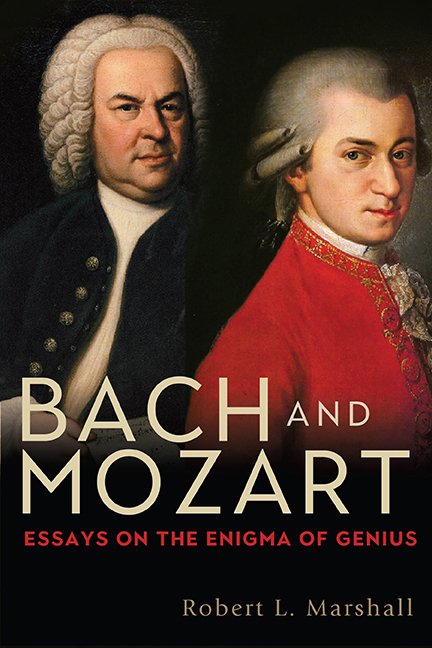Book contents
- Frontmatter
- Dedication
- Epigraph
- Contents
- List of Figures
- Preface
- List of Abbreviations
- Prologue. The Century of Bach and Mozart as a Music-Historical Epoch: A Different Argument for the Proposition
- 1 Young Man Bach: Toward a Twenty-First-Century Bach Biography
- 2 The Notebooks for Wilhelm Friedemann and Anna Magdalena Bach: Some Biographical Lessons
- 3 Bach and Luther
- 4 Redeeming the St. John Passion–and J. S. Bach
- 5 Bach's Keyboard Music
- 6 The Minimalist and Traditionalist Approaches to Performing Bach's Choral Music: Some Further Thoughts
- 7 Truth and Beauty: J. S. Bach at the Crossroads of Cultural History
- 8 Bach at Mid-Life: The Christmas Oratorio and the Search for New Paths
- 9 Bach at the Boundaries of Music History: Preliminary Reflections on the B-Minor Mass and the Late-Style Paradigm
- 10 Father and Sons: Confronting a Uniquely Daunting Paternal Legacy
- 11 Johann Christian Bach and Eros
- 12 Bach and Mozart: Styles of Musical Genius
- 13 Mozart and Amadeus
- 14 Bach and Mozart's Artistic Maturity
- 15 Mozart's Unfinished: Some Lessons of the Fragments
- Epilogue (ossia Postmortem). Had Mozart Lived Longer: Some Cautious (and Incautious) Speculations
- Notes
- Works Cited
- Index
- Miscellaneous Endmatter
- Eastman Studies in Music
11 - Johann Christian Bach and Eros
Published online by Cambridge University Press: 29 March 2020
- Frontmatter
- Dedication
- Epigraph
- Contents
- List of Figures
- Preface
- List of Abbreviations
- Prologue. The Century of Bach and Mozart as a Music-Historical Epoch: A Different Argument for the Proposition
- 1 Young Man Bach: Toward a Twenty-First-Century Bach Biography
- 2 The Notebooks for Wilhelm Friedemann and Anna Magdalena Bach: Some Biographical Lessons
- 3 Bach and Luther
- 4 Redeeming the St. John Passion–and J. S. Bach
- 5 Bach's Keyboard Music
- 6 The Minimalist and Traditionalist Approaches to Performing Bach's Choral Music: Some Further Thoughts
- 7 Truth and Beauty: J. S. Bach at the Crossroads of Cultural History
- 8 Bach at Mid-Life: The Christmas Oratorio and the Search for New Paths
- 9 Bach at the Boundaries of Music History: Preliminary Reflections on the B-Minor Mass and the Late-Style Paradigm
- 10 Father and Sons: Confronting a Uniquely Daunting Paternal Legacy
- 11 Johann Christian Bach and Eros
- 12 Bach and Mozart: Styles of Musical Genius
- 13 Mozart and Amadeus
- 14 Bach and Mozart's Artistic Maturity
- 15 Mozart's Unfinished: Some Lessons of the Fragments
- Epilogue (ossia Postmortem). Had Mozart Lived Longer: Some Cautious (and Incautious) Speculations
- Notes
- Works Cited
- Index
- Miscellaneous Endmatter
- Eastman Studies in Music
Summary
Much about the life of Johann Sebastian Bach's youngest son remains obscure. Factual lacunae, contradictions, ambiguities, along with insinuations touching on his private life punctuate the biographical record almost from the very beginning.
Uncertainty concerning certain basic facts about Johann Christian Bach begins as early as the testimony of a firsthand source one would have considered unim-peachable, namely, Carl Philipp Emanuel Bach. Emanuel, it will be recalled, had taken in his fifteen-year-old half-brother to live with him in Berlin following the death of their father in July 1750. Who would know better than Emanuel the year in which Christian left his home? In Emanuel's annotation of the family Genealogy he remarks that Christian “traveled in the year 1754 to Italy” (reiste ao. 1754 nach ltalien). His claim, understandably, was dutifully repeated later by reliable eigh-teenth-century writers such as Ernst Ludwig Gerber.
Along with the question of when Johann Christian left for Italy one can ask the connected question: how did he get there, that is, under what circumstances? Here, again, early commentators have something to say. Johann Nikolaus Forkel provides the intriguing detail that Christian, while living with Emanuel in Berlin, had “made the acquaintance of many female Italian singers, one of whom talked him into going to Italy with her” (er mit vielen italienischen Sängerinnen bekannt wurde, deren eine ihn beredete mit ihr nach ltalien zu gehen). And Gerber's dictionary informs us, like-wise, that “the acquaintance with various female Italian singers awakened in him the desire to see Italy” (in ihm die Bekanntschaften verschiedener ital. Sängerinnen die Lust erweckten, ltalien zu sehen).
Charles Sanford Terry, while citing these early sources, was apparently the first person to question both the dating of Christian's departure and the prevailing explanation behind his decision to head for Italy, an explanation that had evolved in a curiously colorful fashion since the time of Forkel and Gerber. Terry cites a nineteenth-century writer, one Elise Polko, who claimed that Christian, “repelled by the prospect of passing his life as an organist in some obscure German community … found relaxation under the beaux yeux of Benedetta Emilia Molteni (1722–80), prima donna of the Berlin Opera.” Polko reported further that Molteni married Johann Friedrich Agricola (1720–74), Frederick the Great's court composer, but that “the pair were hindered by their coachman's death from starting a honeymoon in Italy.
- Type
- Chapter
- Information
- Bach and MozartEssays on the Engima of Genius, pp. 174 - 185Publisher: Boydell & BrewerPrint publication year: 2019

